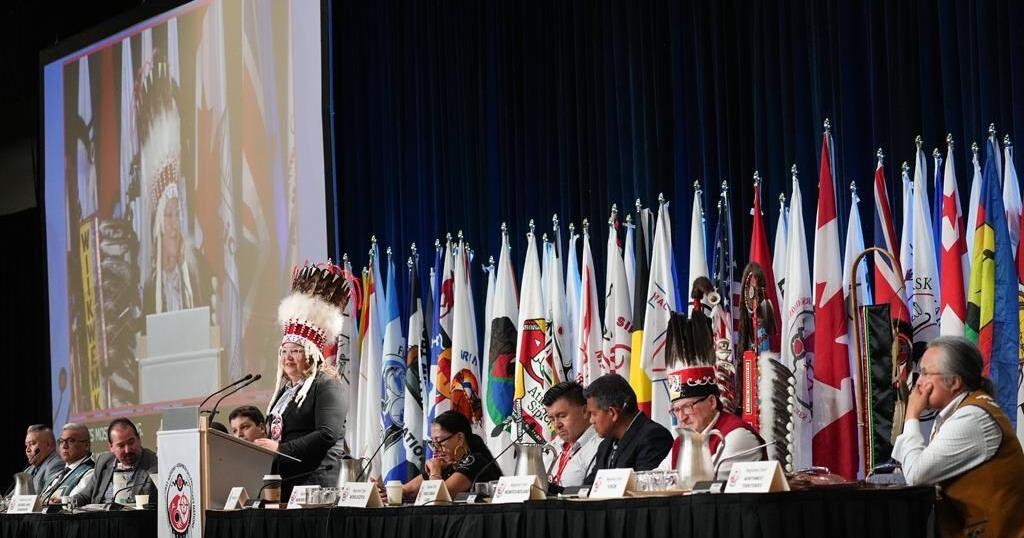OTTAWA – The plaintiffs who successfully sued Canada over discrimination in the child welfare system gave emotional speeches on Thursday urging First Nations chiefs to support a landmark $47.8-billion deal to reform that system.
The deal was struck in July between Canada, the Chiefs of Ontario, Nishnawbe Aski Nation and the Assembly of First Nations after a nearly two-decade legal fight over the federal government’s underfunding of on-reserve child welfare services.
The Canadian Human Rights Tribunal said that was discriminatory. It tasked Canada with coming to an agreement with First Nations to reform the system, and also with compensating children who were torn from their families and put in foster care.
Chiefs are in Calgary this week for an Assembly of First Nations gathering where they are set to vote on the agreement. So far, dozens of them have raised concerns about how it will work. Some service providers say their funding levels will be significantly cut, which will prevent them from doing their work effectively.
Carolyn Buffalo, a mother from Montana First Nation in Maskwacis, Alta., was one representative plaintiff in the class-action for Jordan’s Principle families.
Jordan’s Principle is a legal rule named after Jordan River Anderson, a First Nations child born in 1999 with multiple health issues that kept him in hospital from birth. He didn’t leave the hospital until he died at the age of five, and governments couldn’t agree on who should pay for his home-based care.
Buffalo’s son, Noah, has cerebral palsy and requires continuous care. But Ottawa has been making that care difficult for him to access on reserve.
Speaking through tears at the assembly, Buffalo said she thinks chiefs will vote down the deal she and others have worked on for years in an attempt to stop Canada’s discrimination against First Nations children. She said kids will be left without protection if the deal is rejected.
“I didn’t even want to come to this assembly because I knew that politically it was going to be tough,” she said.
“Do I trust the AFN? No. Do I trust the Liberal government? No, but I am a supporter of this legal process. That’s why we agreed to join and be part of it. If I thought for one second that this was going to be harmful to our people, I wouldn’t be part of this … Go ahead, scuttle the agreement. But if the deal is lost, just remember what I said.”
Another representative plaintiff, Ashley Bach, was removed from her community as a child. She urged chiefs to remember that many children in care are watching the assembly, even though the topic is traumatizing for them and some conversations have been hostile.
“This is a once-in-a-childhood agreement, because if we take too long we’re going to lose another generation,” she said.
“If we wait years and years for a perfect agreement, they won’t be kids anymore. They’ll be like me.”
Speaking to chiefs on the first day of the special assembly Wednesday, AFN National Chief Cindy Woodhouse Nepinak urged the chiefs to vote for the deal so it is in place before the next federal election.
Woodhouse Nepinak said she’s tried to build bridges with Conservative Leader Pierre Poilievre, but she can’t guarantee a better deal could be reached with him based on that party’s record on Indigenous issues and its promise to cut spending.
The First Nations Child and Family Caring Society, which helped launched the initial human rights complaint, has been urging chiefs to reject that framing and look more closely at the deal.
Its executive director, Cindy Blackstock, said Thursday morning that orders from the human rights tribunal don’t disappear if this deal is not accepted.
“I’ve lived through the Harper years, and the Canadian Human Rights Tribunal survived through the Harper years,” she said, referencing former Conservative prime minister Stephen Harper.
“Everything is on the table.”
Before the agreement was announced in July, some regional chiefs raised concerns that it had been negotiated in secret. Some child welfare experts have also said the deal doesn’t go far enough to ensure Canada’s discrimination never happens again, and accused the Assembly of First Nations of excluding the Caring Society from the process altogether.
The Squamish Nation said Wednesday its concerns about the deal have been ignored by both Canada and the Assembly of First Nations.
This report by The Canadian Press was first published Oct. 17, 2024.
